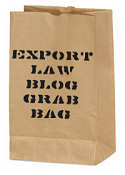![Universal Industries HQ via Google Maps https://goo.gl/maps/TNQDh [Fair Use] Universal Industries HQ via Google Maps https://goo.gl/maps/TNQDh [Fair Use]](https://www.exportlawblog.com/images/universal_industries.jpg)
ABOVE: Universal Industries HQ
Russell Henderson Marshall, a UK citizen living in Florida, pleaded guilty and was sentenced to 41 months in prison and deportation on charges that he brokered dual-use items listed on the Commerce Control List. Yes, that’s right — for brokering non-USML items listed on the CCL. Because there is no prohibition on unlicensed brokering of items on the CCL, you may wonder how this happened.
To understand how this happened, we have to go back to 2012 when Universal Industries Limited, Inc., was slapped by the Bureau of Industry and Security with an Order Denying Export Privileges based on Universal’s conviction under the Arms Export Control Act for unlicensed exports of military aircraft parts. The order prohibited Universal or any of its employees from “carrying on negotiations concerning … any item … to be exported from the United States.”
Marshall was the CEO of Universal and was charged with two counts of violating the denial order. The first count, as described in the factual proffer supporting Marshall’s guilty plea, alleged that he sent an email to a potential U.S. purchaser quoting a price for three aircraft temperature sensors. A document recovered after a BIS agent did some dumpster diving behind Universal’s office. Â Documents found in the trash revealed that the sensors were destined for the Royal Air Force of Thailand. The second count alleged that Marshall exchanged emails with a U.S. company related to a jet aircraft part to be exported to the Pakistan Air Force. The content of the emails sent by Marshall are not revealed.
Oddly, the factual proffer devotes considerable space to establishing that the items involved were ECCN 9A619.x. Given that the Denial Order would be violated if Marshall sent an email with a price quote for a Snickers Bar that was to be sent to Canada as a family birthday gift, it is not quite clear why the documents go to such length to establish that the items were not simply EAR99.

 Posted by
Posted by  Category:
Category: 

![Airport Firearms Declaration by Nick Holland [CC-BY-SA-2.0 (http://creativecommons.org/licenses/by-sa/2.0)], via Flickr https://www.flickr.com/photos/nic1/2569359725 [cropped] Airport Firearms Declaration by Nick Holland [CC-BY-SA-2.0 (http://creativecommons.org/licenses/by-sa/2.0)], via Flickr https://www.flickr.com/photos/nic1/2569359725 [cropped]](https://www.exportlawblog.com/images/firearms_declaration.jpg) Customs and Border Protection has
Customs and Border Protection has ![Smart Power Systems and Bahram Mechanic via http://www.smartpowersystems.com/content/main/corporateinformation.html [Fair Use] Smart Power Systems and Bahram Mechanic via http://www.smartpowersystems.com/content/main/corporateinformation.html [Fair Use]](https://www.exportlawblog.com/images/smartpower.jpg) Houston-based Smart Power Systems and its CEO Bahram Mechanic (as well as various other individuals) were
Houston-based Smart Power Systems and its CEO Bahram Mechanic (as well as various other individuals) were ![Judge Tim Wright [Credit: Williamson County][Fair Use] Judge Tim Wright [Credit: Williamson County][Fair Use]](https://www.exportlawblog.com/images/JudgeWright.jpg)
 Here are a few recent developments that you may have missed:
Here are a few recent developments that you may have missed:

